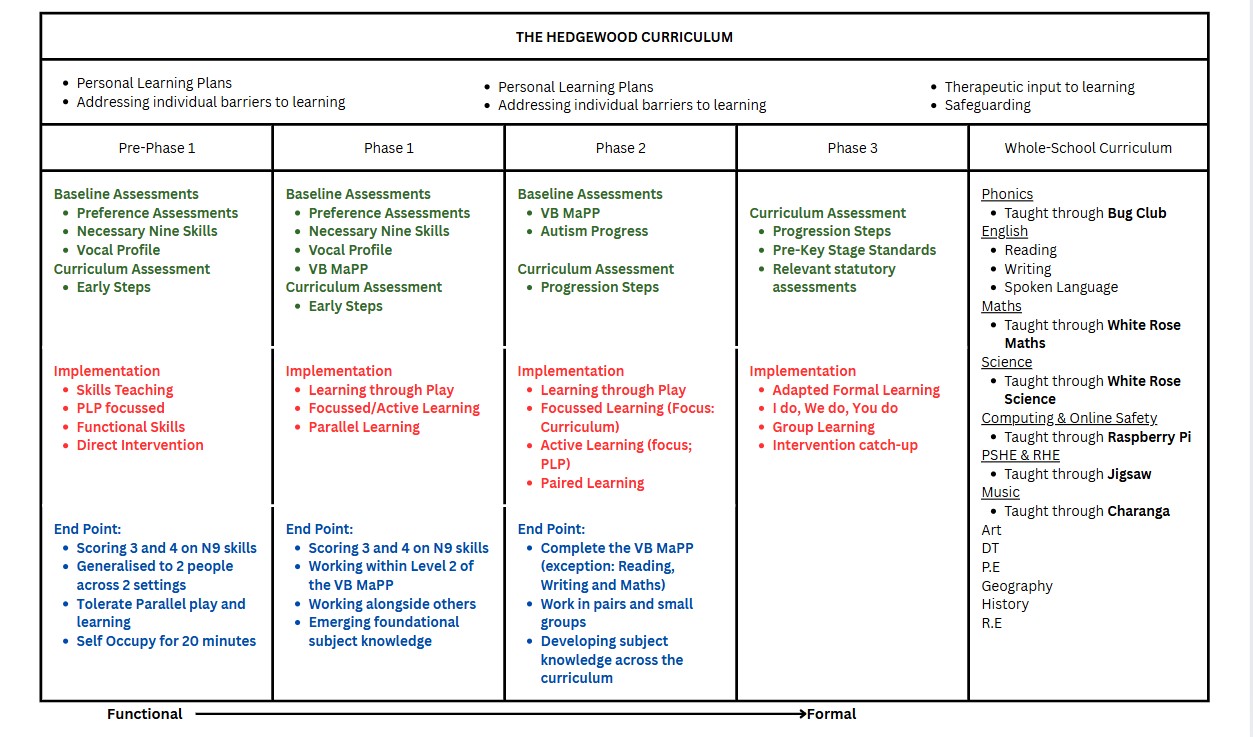Our Curriculum
Our curriculum is designed to ensure each pupil develops communication, critical learning behaviours, independence and functional life skills.
Our four curriculum phases designed to offer a personalised learning experience tailored to each child’s specific needs. Whether children are engaging in early developmental learning or accessing the National Curriculum at a level relevant to them, all pupils are supported to develop skills that are purposeful and meaningful to them.
Our phased approach allows us to streamline teaching and provision so that more targeted and specific learning can take place at every stage. Personal Learning Plan (PLP) are designed to address a child's unique learning barriers, with highly personalised provision to meet their needs.

Our four distinct curriculum phases, each having a clear focus and progression. These four phases provide a comprehensive overview of our school's curriculum. We ensure staff have a clear understanding of how the subject content within each phase is linked and contributes to the overall curriculum.
Whilst the phases are distinct, we continually review your child's progress, moving children (across phases) as their learning needs change, ensuring a seamless learning experience.
The four phases enable us to tailor curriculum content, pedagogy and pace to ensure each pupil can fully access and engage with the learning, optimising their progress and success.
Hedgewood’s broad and balanced curriculum is taught in conjunction with the personalised targets set out in each child's Personal Learning Plan (PLP). PLP skills are designed to address a child's unique learning barriers, with highly personalised provision to meet their needs.
Personal Learning Plan (PLP) targets are derived from the objectives set out in each a child's Education, Health and Care Plan (EHCP) and from our precise use of evidence-based assessments of a childs current needs. The purpose is to ensure each pupil develops critical learning behaviours and functional life skills, including the ability to communicate, be independent and develop emotional-regulation skills.
Every child’s Personalised Learning Plan (PLP) serves as a mid-term strategy for addressing their unique needs and learning gaps. We encourage parents and carers to actively engage with a pupil’s PLP, becoming a ‘learning partner’ with their child’s class teacher. In this way, working together, they help their child to achieve the best possible outcomes.
Curriculum Maps, Planning and Adaptation.
For each subject area there is a curriculum map setting out a clear sequence and progression of knowledge and skills (knowledge in action) for each phase of the curriculum.
For each Phase, there is a comprehensive overview of the coverage of the school's curriculum.
- Long-term plans outline the topics for each year in each phase.
- Medium-term plans outline the termly coverage for each phase, with an individual pupil’s Personal Learning Plans (PLP) providing a mid-term strategy to address their specific needs and barriers to learning.
- Short term personalised lesson plans are adapted on a daily basis to meet individual needs. Short term planning adaptation is based on curriculum maps and termly coverage.
Achievement and Assessment
Our assessment practices are designed to recognise every small step in a child's journey as a significant achievement. Our systems are rigorous, aiming to track and celebrate progress at all levels. We are committed to providing personalised and meaningful learning through comprehensive assessment.
We employ a wide array of tools and processes to assess, map, and report each child’s progress. These include:
- Baseline Assessment upon admission to the school.
- Ongoing Teacher Assessment across all curriculum and developmental areas.
- Person-Centred Annual Reviews of the Education, Health and Care Plan (EHCP).
- Personalised Learning Plan (PLP) Targets are directly informed by EHCP outcomes.
- B-squared Connecting Steps Assessment Framework
- Seesaw Learning Journey Entries that showcase pupils learning journeys.
- The use of Pre-Key Stage Standards and National Curriculum Standards where applicable.
- Pupil Profiles covering essential areas such as eating, drinking, toileting, communication, and behaviour.
- To identify and address pupils’ PLP learning skills, we utilise evidence-based assessment tools VB-MAPP (Verbal Behavior Milestones Assessment and Placement Program): This is implemented in collaboration with education specialists, BCBAs, Speech and Language Therapists, Occupational Therapists, parents, and governors. The VB-MAPP is applied in Phase 1 and early Phase 2 to evaluate communication, attention, and interaction barriers.
Formative assessment is central to our practice. Teachers continuously assess progress against individualised PLP targets using the “Assess, Plan, Do, Review” cycle, which aligns closely with the SEND Code of Practice (0-25). This cycle ensures that pupils receive the best possible provision and achieve meaningful outcomes, that practice continuously evolves to meet pupils’ emerging needs, and that EHCP planning and reviews remain relevant and effective.
Monitoring, Reporting, and Parent Engagement: We have clear processes for monitoring and reporting progress:
- Baseline Assessment is completed within six weeks of a pupil’s start date, involving teachers, Phase Leaders, Therapists, and parent/carers.
- Progress against PLP targets is formally reviewed and reported twice annually—in February and July.
- Teachers make progress judgements (Mastered, Understanding and Gaining skills, Engaging), supported by detailed commentaries.
- PLP Updates incorporate both direct and indirect learning outcomes, acknowledging broader developmental gains.
- These progress reports form the basis of our Parent Consultation Evenings, supporting meaningful dialogue about achievements and next steps.
Our use of the Seesaw app strengthens home–school partnerships by offering real-time insights into pupils' learning. Parents & Caers receive photos, videos, and updates showcasing daily activities and milestones. Teachers share progress aligned with PLP targets and Learning Goals, and parents can comment and collaborate, reinforcing learning beyond the classroom.
All assessment data is centrally managed and accessible via B-squared and the Hedgewood Assessment Tool, a bespoke Excel tool that supports teachers in tracking progress, setting targets, and planning next steps. This comprehensive and person-centred approach ensures that Hedgewood supports pupils to make progress and achieve their full potential.
